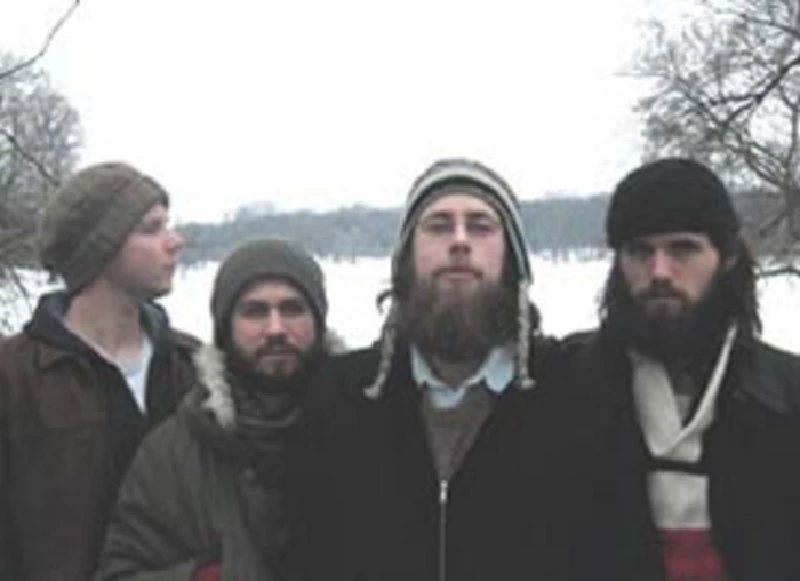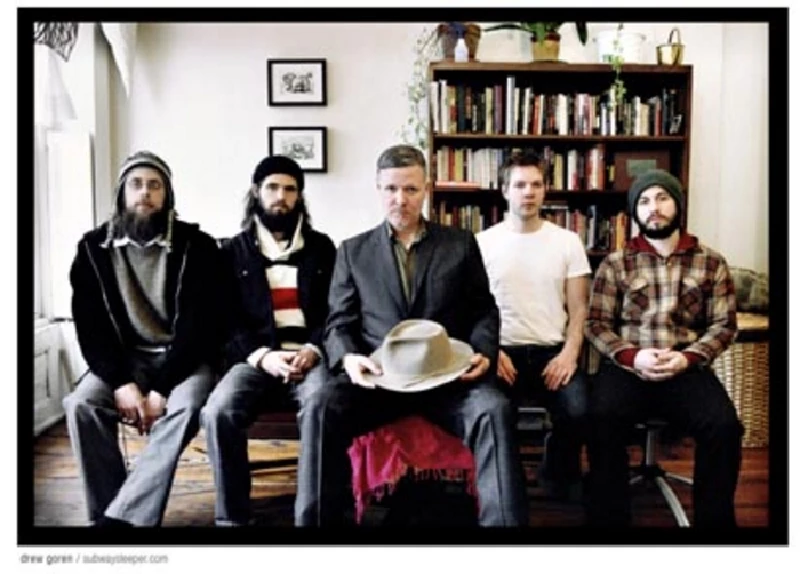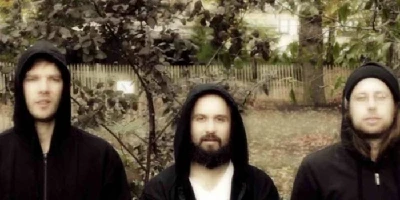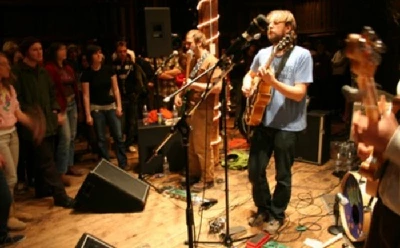Akron/Family - Interview
by Jamie Rowland
published: 16 / 4 / 2006

intro
Akron/Family's music combines four-way vocal harmonies, folk, rock and psychedelia. Signed to Michael Gira's Young God label, they have released both their album and a joint record with Gira. Jamie Rowland chats to guitarist Seth Olinsky
The best way to introduce Akron/Family is to tell you about their live shows. They’re loud and unpredictable, full of drawn out jams, perfect four-way vocal harmonies, gentle folk, full-on rocking out and a heap of psychedelic noise. People have been raving about Akron/Family’s live shows for some time now, and I have to say that they totally live up to the hype. The band hail from Brooklyn, New York, and, although they all sing and play various instruments, can be loosely assigned to these roles within the band: Dana Janssen on drums, Seth Olinsky on guitar, Miles Seaton on bass and Ryan Vanderhoof on guitar and vocals. They were signed to Young God Records by Michael Gira in 2004 after sending him a number of home recorded CDs. These CDs were eventually cut down to a select few which made up the band's first, self-titled debut album, which was released in March 2005. In the same year, the band toured with Gira as both his support act and his backing band in Angels of Light, a coupling which lead to the split Akron/Family & Angels of Light album at the end of last year. During a visit to the UK in April, I met up with Seth to talk about touring, recording and working with Michael Gira. PB : How did you all get together as Akron/Family? SO: I met Miles, the bass player, in New York City. We’d both moved there about the same time. We met each other a few months after we moved there, and we started playing together, and that was for a few months. I grew up with Dana, the drummer. He ended up moving to the city around that time and so we started playing with him. And then Dana and I had known Ryan, the fourth member, for years before, so we invited Ryan to move to the city too to be in the band. So it started with me and Miles and then we just added the other guys. PB : After you got together, is it right you came up with 3 albums worth of material in a short space of time? SO : Yeah, I guess so. Miles and I recorded about an album’s worth of stuff together, just he and I, and then when Dana moved he played a little bit on that, and by the time all 4 of us got together we had a whole new set of material that was just based on the 4 of us; it was more loud and rock. And then at the same time, I was recording a lot more stuff with some of the guys at home too. So we had a kind of breath of stuff from what Miles and I started with to the full band and more home recordings. So we kept sending more and more stuff to Michael Gira and the first album was compiled from 3 or 4 CDs worth of material. But not all great! There were some misses on there too. PB : You sound like a really tight band on record; you obviously work well as a group. Was that an immediate thing, or did you have to put lot of work in to get to that point? SO : Well we played a lot and we worked a lot together. I grew up with Dana, so I’d already been playing with him for a long time. It took us a long time to get it together. We practised a lot, played a lot of shows. This last year we’ve played something like 200 shows. It took work to get it together. PB : Do you prefer touring or recording music? SO : At this point, I’m pretty over touring. Playing live maybe would be a better way to say it. Touring and playing live are really separate same thing, I mean you could be playing live and not necessarily be touring. Touring is just really hard work. You’re away from home all the time. You don’t have any time or energy to do anything else except be on tour and be a brainless rock dude. You’re just basically drooling all day long. Then someone pushes you up on stage and then you perform, and then you drool until the next day when you perform. All it’s designed for is playing shows, and for me I’m more interested in doing other things than that in our lives, like reading or thinking, or having lives and girlfriends and houses, and creating new music. I mean I like recording and I like playing music live; I like both sides of it, but the thing with touring is it’s so one sided. All you can do is play live, so I think it’s maybe about striking a good balance. The band’s pretty different live than it is in the studio; we tend to do different things in both places. I like both. Touring, I’m a little bit tired of. PB : In your live shows, is it right that you do a lot of improvisation? SO : Yeah, it varies from night to night, but mostly, at this point…like, when we’re playing less, we’ll tend to do more improvisation, but when we’re playing more it tends to take shape around the songs, but we’ll improvise the introduction of a song, or have sections of songs that are more open to doing different things each night. So we kind of improvise within the form of the songs. It ends up being more like jamming, it’s not like we’re setting up to do free improvisations with no concept of what we’re doing. Like I said, after you do it night after night, it’s open. It’s not scripted, but it ends up being fairly similar. PB : After touring for so long, are there any shows or support acts that stick out as being particularly memorable? SO : We did a series of shows that ended in December last year, that we called The great American Mess tour. That kind of stands out. We were playing 3 hour shows, always taking our shirts off – they were just ridiculous. They were total over the top, indulgent noise improvisation, with chant sing-a-longs with the crowd. It was just really retarded. They were so long, they were like Vision Quest, like really, 2 and a half, 3 hour shows. So that little string of shows sticks out. But other than that it’s all been kind of a blur. But we’ve met a lot of nice people along the way. PB : You recorded a Radio 1 session during the day yesterday. How did that go? SO: It went okay. I mean it was kind of hard. We were all tired. It’s like you have 6 hours to set up and record, but it came out really well. The engineer was a really nice guy; he had worked on the last Jerry Garcia album, so we bonded over Jerry Garcia. Yeah, it was fun. PB : There are a lot of comparisons made about Akron/Family that seem, not necessarily strange, but maybe hard to live up to, for example comparisons to the Beatles. How do you feel when you hear something like that? SO : Well, the Beatles makes sense, because we like the Beatles, so we rip them off a lot. So that’s cool, I mean at least people recognise who we’re ripping off, I guess. I don’t know, I mean, nothing against journalists, but they tend to just like to talk about other bands in relation to whoever. That seems to be what most journalism constitutes of, listening to music and then saying this music sounds like a combination of these things, which to me seems like a very surface analysis of things. I mean I guess most rock music has to do with surfaces. I mean appearance is a big theme, like what people look like, and sound is discussed in terms of what people sounds like, but that’s just the surface of something, you know? No one really talks much about the meaning of things. I mean the idea is that we’re trying to express ideas, and sometimes the best way to do that is we borrow from the Beatles, or we borrow from Zeppelin, or Beefheart, or Wolfheiser. I don’t know, whoever. It’s just like open, I mean we just say “oh, maybe we could do it like this…”, but that’s not necessarily what’s important about it. So, whatever,sometimes we borrow from the Beatles, and then people are like “they sound like the Beatles” and – well, sure! I mean, we all grew up listening to the Beatles. We like the Beatles. We steal from the Beatles. I guess it’s a compliment. Or lazy journalism, I don’t know. PB : With the split Akron/Family & Angels of Light album, where you approached by Michael Gira with that idea, or did you approach him? SO : That was his idea, because we had done the tour with him – does this tea look dark enough? You’d probably know better than I do. PB : I’m not sure, I usually have milk in tea. I think that might just be good quality tea. That’s how it always looks on TV adverts. SO : Okay, cool. That’s how things should be. Yeah, that was his idea, because once we got off the tour, he kind of wanted to document the tour itself, which was us opening for him and then backing him up. And plus, he really liked the material that we were doing at that time, the more rock stuff and the live sound, but he didn’t want to do another full length with us at that time. There really just wasn’t time to do that, so we were just trying to get that stuff out while it was still happening. It was kind of a combination of documenting what we were doing and documenting the tour. But it was his idea. He has some good ideas sometimes. PB : I really love that record, by the way. I think it’s because it just really sounds like you’re having a good time making the music, do you know what I mean? SO : Yeah! It’s a total lie. We hate ourselves. We hate each other. We’re totally mysterious, dark and unhappy. PB : How different is it playing with Angels of Light than playing as Akron/Family? SO : Playing with him is definitely different. It’s not necessarily that we’re hired musicians, but it engages a different part of your brain. For me, it’s more the perspective of I’m a guitar player, playing in this guy's band, and I’m contributing to his song, whereas with our music, there’s ownership and the perspective is less of that of an instrumentalist, and more of like being involved in creating the music. With Akron/Family, I’m much more involved totally and fully, whereas with Angels of Light I’m just contributing to this guy’s record. But they’re both fun, I really enjoy the different perspectives, I feel like it uses a different part of my brain and different aspects of what I can do, so it’s made for growth as us as musicians and maybe us as a band, to be able to just serve something singularly and not be concerned with our roles in it. PB : Are there plans for any more records with Angels of Light? SO : Yeah, we’re goin to do a full length this summer. We’re taking off from Akron/Family, but we’re doing a full length Angels. I think it’s August we’re going to be doing it. So that’s exciting. PB : Is there any kind of song writing process for your band? SO : It’s pretty different, which I think is reflected, especially in the first album. Every song is pretty different. Most of the songs have been written by myself or Ryan at first in different states. Some of them were fleshed out an pretty much done, and then some were more just like guitar and vocals, and then the band worked on it for a long time. ‘Running, Returning’ on the first record was just a bass riff that Miles had and then we built on that and it kept changing. So it’s pretty different for each song. Who knows, the new material might be like, we’ll all write together, or maybe we’ll all write individually, I don’t know. PB : What are your plans for the foreseeable future? SO : It’s a little up in the air. We did a recording about a month ago with a free jazz drummer called Hamid Drake. He’s really amazing. He’s been a hero of mine for 3 or 4 years. Really fantastic; plays with Peter Brötzmann, William Parker, the upper echelons of the free jazz world. So we’re going to edit that together into an EP, that’ll come out in the Fall, and then there’s the Angels of Light, and then in the Fall we’ll probably record a new full-length. Just take it easy from touring, make some more music. PB : Do you think the new record will sound like the first album or more like the Akron/Family and Angels of Light record? SO : I hope it’s not going to be like either of them. I think if we rushed it that it would probably sound like a mix between the two. Hopefully, if we take enough time…I think we’re all ready for a change, you know, we’ve been touring for such a long time and doing the same stuff. We’re all ready to do something different. I don’t know if any of us knows quite what it is, but I’m sure we’ll figure it out. Someone will have a revelation. PB : Thank you.
Picture Gallery:-

interviews |
|
Interview (2011) |

|
| Jamie Rowland speaks to Seth Olinsky from psychedelic folk act Akron/Family, about his group’s Japanese-influenced seventh album, ‘S/T II: The Cosmic Birth and Journey of Shinju TNT’, and the video films that have been created to accompany each of the tracks on the new album. |
| Interview (2009) |
| Interview (2007) |
live reviews |
|
ICA, London, 20/5/2009 |

|
| Despite having recently lost founder member Ryan Vanderhoof and now being reduced to a three piece, Sarah Johnson at the London ICA finds New York experimental folk act Akron/Family having lost none of their spontaneity, but also having an increased tightness |
| Barrymore's, Ottawa, 26/9/2008 |
reviews |
|
S/T II: The Cosmic Birth and Journey of Shinju TNT (2011) |

|
| Superb sample and loop-influenced fifth album from New York-based psychedelic folk act, Akron/Family |
| Love is Simple (2007) |
| Meek Warrior (2006) |
| Akron/family (2005) |
most viewed articles
current edition
Carl Ewens - David Bowie 1964 to 1982 On Track: Every Album, Every SongEditorial - July 2025
Billie Eilish - O2 Arena, London, 10/7/2025
Bathers - Photoscapes 2
Bathers - Photoscapes 1
Hothouse Flowers - Photoscapes
John McKay - Interview
Cleo Laine - 1927-2025
Simian Life - Interview
the black watch - Interview
previous editions
Heavenly - P.U.N.K. Girl EPTrudie Myerscough-Harris - Interview
Pixies - Ten Songs That Made Me Love...
Boomtown Rats - Ten Songs That Made Me Love....
Fall - Hex Enduction Hour
Peter Paul and Mary - Interview with Peter Yarrow
Sam Brown - Interview Part 2
And Also The Trees - Eventim Apollo, London, 21/12/2014.
Doris Brendel - Interview
Place to Bury Strangers - Interview
most viewed reviews
current edition
Sick Man of Europe - The Sick Man of EuropeAmy Macdonald - Is This What You've Been Waiting For?
Phew, Erika Kobayashi,, Dieter Moebius - Radium Girls
Alice Cooper - The Revenge of Alice Cooper
Blueboy - 2
Lucy Spraggan - Other Sides of the Moon
Cynthia Erivo - I Forgive You
Bush - I Beat Loneliness
Davey Woodward - Mumbo in the Jumbo
Philip Jeays - Victoria
Pennyblackmusic Regular Contributors
Adrian Janes
Amanda J. Window
Andrew Twambley
Anthony Dhanendran
Benjamin Howarth
Cila Warncke
Daniel Cressey
Darren Aston
Dastardly
Dave Goodwin
Denzil Watson
Dominic B. Simpson
Eoghan Lyng
Fiona Hutchings
Harry Sherriff
Helen Tipping
Jamie Rowland
John Clarkson
Julie Cruickshank
Kimberly Bright
Lisa Torem
Maarten Schiethart